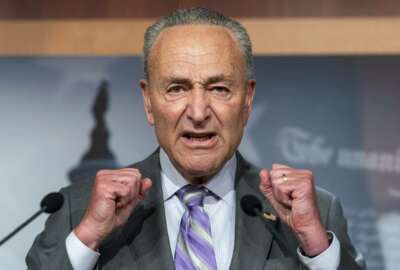
CFC calls for donations during difficult time for many
Federal employees might be working from home, but they're working. That plus the extra needs of the needy because of the pandemic made for a surprising kickoff of...
Best listening experience is on Chrome, Firefox or Safari. Subscribe to Federal Drive’s daily audio interviews on Apple Podcasts or PodcastOne.
Federal employees might be working from home, but they’re working. That plus the extra needs of the needy because of the pandemic made for a surprising kickoff of this year’s Combined Federal Campaign. Federal Drive with Tom Temin checked in with the co-chair of the Coordinating Committee for the National Capital Area for the Combined Federal Campaign, Vince Micone.
Interview transcript:
Vince Micone: So we held kickoff on Tuesday, September 22. And we were absolutely amazed because over 10 times more people participated in our virtual kickoff than we’ve had come to our events that have been held in buildings in DC. And so we were just thrilled by the number of folks who became engaged with the campaign early on, and that actually converted into charitable contributions. This week alone, we’ve raised over $210,000. That’s about $70,000 a day. Last year, we were raising $50,000 a day when we had our kickoff. So this is just really something that even we weren’t expecting. We thought we’d have more people join, but our numbers have really been surprising and great.
Tom Temin: So more people and more money. Do you expect that to continue as this drags on through the fall — I shouldn’t say drags on — as this continues with great optimism throughout the fall?
Vince Micone: Well, we do. So look, federal employees, whenever we have rough times federal employees help out through the Combined Federal Campaign. We’ve seen it in the past, with natural disasters when we had special solicitations. And we saw it this spring when we had a special solicitation for pandemic contributions. And nationwide $2.7 million was raised, a million of that in DC. So already just starting out this campaign year, we have a million dollars in the bank already that’s helping, and we know people are going to be responding to the wildfires, they’re going to be responding to organizations and causes to help people with the storms that affected the South. And of course, people are going to continue contributing to their favorite charities and causes as well.
Tom Temin: Are there any covid or pandemic related types of charities or causes you think might also be prompting people to dig deeper?
Vince Micone: Well, it’s interesting you asked that because we had a charity fair online yesterday, a panel of about seven charity leaders, and they all talked about how CFC was their primary source of contributions. And that other sources of contributions have dropped off during the pandemic period, some of the dollars that they got from private sector organizations, some of the individual donations they received. So to a certain extent, all federal employee participation in the CFC helps those organizations that have been impacted one way or another. And, of course, we know there are dozens of healthcare organizations in the National Capital Area, hundreds, thousands nationwide in the CFC, that are providing support and care services through their normal missions.
Tom Temin: In other words, there’s awareness that the standard charities are strained, because whatever their missions might be, they’ve got more clientele because of hardship one way or another because of the pandemic.
Vince Micone: Yeah, I mean, they’re just they’re seeing fewer dollars come in. And so to them, the dollars that come in to commitment through CFC helped them do what they do every single day.
Tom Temin: And with respect to the overall trends from, say, 10 years ago, I mean, it has been trending down, it’s been tough with government shutdowns and continuing resolutions, do you expect maybe you’ve seen the bottom of the bathtub?
Vince Micone: So my view is that we’re on the way up. What’s been happening as a result of the pandemic is we are learning to work in very different ways. And for the first time, we’re harnessing tools in the virtual world that help us reach more people. And I believe for a number of years that doing the traditional stuff that we do in the campaigns is useful, but we’re not reaching a lot of new donors who are younger, whose first connection with their communities might be virtually where they get involved. So this to a certain respect has forced us to look at our entire business model and change it up. And I think as a result of that, we’re learning how to have more effective programs, we’re able to talk about causes that are important to people and get their attention. And we’re able, frankly, to reach more people than we ever have before. I think that is going to be the key to this campaign in the future. And if our offices are open in a few months, and I hope they are, we’re all back to normal, there’s a vaccine, we’re going to the offices, we’re living our lives the way we always have. I know and I’m confident this campaign will be forever altered because we’re going to reach people and communicate in very different ways.
Tom Temin: In other words, you’ve got to somehow harness the Venmo generation for lack of a better word.
Vince Micone: Yes, we do. We need to harness them. We need to keep our historic donors. But we also know at the CFC, and I see this myself, when I started out my career a long time ago, I gave very small contributions and those grew as I got promotions, started making more money. And then we have that cycle, as people retire, you bring new folks in, they give small donations — and a big difference too, generations today want to be engaged through volunteerism, as well as giving money, they want to put sweat equity in what they’re doing. Combined Federal Campaign now employs the opportunity to commit volunteer hours to those organizations and causes they care about as well as financial contributions. So we’re also reaching a whole new set of folks that we haven’t met before. And even how we’re reaching out, it was really cool. Stars and Stripes reached out to us and we worked with them as a partner this year to broadcast our kickoff. So the women and men of the military could actually see that kickoff event if they wanted to. So even those sort of ways that we’re partnering with different modes that reach people are allowing us to talk about how important this is.
Tom Temin: And there’s also the dynamic that I think might be at work. And you can tell me if you think so also — is that federal employees are in fact working. And everyone says, whether they’re in the private sector, or the public sector, I’ve never worked harder in my life than I seem to be right now. But the second breath is, I’m working,
Vince Micone: I can second that. It’s funny, you lose the stress of the commute in the national capital area, go back and forth to the office, although it gives us a great time to listen to you while we’re driving. But it’s amazing how stressful that is. And if you take that out, and you can just get to work at the time you’re supposed to start, your productivity increases. I mean, my agency is going full bore, there’s been no change in what we have been able to accomplish during the pandemic. And I’m very proud of our employees. And I have noticed, I’ve actually had to say, okay, it’s lunchtime, I need to step away from my desk, and I need to go get something to eat, I need to go outside, go for a quick walk and refresh myself. And at the end of the day, too, it’s like, Okay, it’s time to stop working, even though you’re home, you can stop now and enjoy family life. So I do think that that’s been something that’s changed, and everyone’s still getting used to that.
Tom Temin: So in summary, things are pretty much looking up, you’d say for this, and I call it the holiday season, when this all wraps up.
Vince Micone: Right now we’re feeling very, very good about how things have started. My view of the world is not to see the glass as half empty, but to see it as half full all the time. I understand that with federal employees, there is no challenge to difficult that collectively we can’t solve. I mean, that’s what we’ve done in this nation for the 250 plus years that we’ve been around, and it’s gonna be no different now. We’re up to the challenge of anything, including a pandemic, and we will get the job done. And we will step above and beyond to help those in the community. And what motivated us to come work for the federal government, or frankly, state government or local government is a dedication to the values that our country was established on and to serving others. So what we do in CFC is just a way for me to step away from what I do at work every day, and do something different and have a different sort of an impact. But it still cuts to that public service dedication that we all share.
Tom Temin: So you might say it’s possible the Black Swan will have laid golden eggs,
Vince Micone: Possibly, possibly. But I think it’s going to be very important this year for the CFC to help pick up the slack where other people can’t give. So in other words, we have jobs. We are very lucky. Every day I’m thankful for the fact that I work for a great agency, that I get a paycheck and I know many people don’t. So I have a greater responsibility because of that to give back. I mean, I mentioned that in prior interviews, these are the values my parents taught me when I grew up, and it’s how I work every single day.
Copyright © 2025 Federal News Network. All rights reserved. This website is not intended for users located within the European Economic Area.
Tom Temin is host of the Federal Drive and has been providing insight on federal technology and management issues for more than 30 years.
Follow @tteminWFED





